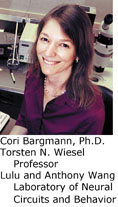
Ancient Molecules and the Modern Brain: Understanding Our Social Nature
| Date: |
Thursday, May 9, 2013 |
Place: |
1230 York Avenue at 66th Street |
| Time: |
12:00 noon – 2:00 p.m |
|
Abby Aldrich Rockefeller Hall |
| |
|
|
The Rockefeller University |
| |
|
|
New York City |
Oxytocin, widely popularized as the “love” or “trust” hormone, is known for its role in human pair-bonding and maternal attachment. As research by Rockefeller University neuroscientist Cori Bargmann, Ph.D. has shown, oxytocin and other brain chemicals associated with human emotions have ancient origins.  Dr. Bargmann, a recipient of the 2012 Kavli Prize in neuroscience, has discovered molecules very similar to oxytocin in one of our distant evolutionary ancestors: a microscopic, soil-dwelling worm that has only 302 nerve cells. Intriguingly, these molecules are associated with basic forms of social behavior. For the 2013 Women & Science lecture, Dr. Bargmann will introduce us to genes and molecules that have changed very little over hundreds of millions of years, which provide insights into attributes that define us as human beings.
Dr. Bargmann, a recipient of the 2012 Kavli Prize in neuroscience, has discovered molecules very similar to oxytocin in one of our distant evolutionary ancestors: a microscopic, soil-dwelling worm that has only 302 nerve cells. Intriguingly, these molecules are associated with basic forms of social behavior. For the 2013 Women & Science lecture, Dr. Bargmann will introduce us to genes and molecules that have changed very little over hundreds of millions of years, which provide insights into attributes that define us as human beings.
Dr. Bargmann is a member of the National Academy of Sciences and the American Academy of Arts and Sciences. In addition to the Kavli Prize, she has received numerous awards including the 2012 NYU/Dart Biotechnology Achievement Award and the 2009 Richard Lounsbery Award from the U.S. and French National Academies of Sciences. Dr. Bargmann also serves as codirector of Rockefeller’s Shelby White and Leon Levy Center for Mind, Brain and Behavior.
For ticket information please contact Amanda Martinez at (212) 327-7728 or amartinez@rockefeller.edu.
For press inquiries, click here